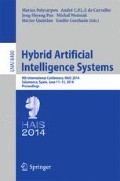Abstract
Actually, a lot of attention focusing on the problem of computing privacy-preserving OLAP cubes effectively and efficiently arises. State-of-the-art proposals rather focus on an algorithmic vision of the problem, and neglect relevant theoretical aspects the investigated problem introduces naturally. In order to fulfill this gap, in this paper we provide algorithms for supporting privacy-preserving OLAP in distributed environments, based on the well-known CUR matrix decomposition method, enriched by some relevant theory-inspired optimizations that look at the intrinsic nature of the investigated problem in order to gain significant benefits, at both the (privacy-preserving) cube computation level and the (privacy-preserving) cube delivery level.
The work reported in this paper has been partially supported by the US National Science Foundation under grants CNS-1111512 and CNS-1016722.
Access this chapter
Tax calculation will be finalised at checkout
Purchases are for personal use only
Preview
Unable to display preview. Download preview PDF.
References
Agrawal, R., et al.: Privacy-Preserving OLAP. In: Proc. of SIGMOD, pp. 251–262 (2005)
Chan, A.C.-F., Castelluccia, C.: A Security Framework for Privacy-Preserving Data Aggregation in Wireless Sensor Networks. ACM Transactions on Sensor Networks 7(4), art. 29 (2011)
Clifton, C., et al.: Tools for Privacy Preserving Distributed Data Mining. SIGKDD Explorations 4(2), 28–34 (2002)
Cuzzocrea, A.: Accuracy Control in Compressed Multidimensional Data Cubes for Quality of Answer-based OLAP Tools. In: Proc. of SSDBM 2006, pp. 301–310 (2006)
Cuzzocrea, A., Bertino, E.: A Secure Multiparty Computation Privacy Preserving OLAP Framework over Distributed XML Data. In: Proc. of SAC, pp. 1666–1673 (2010)
Cuzzocrea, A., Russo, V.: Privacy Preserving OLAP and OLAP Security. In: Wang, J. (ed.) Encyclopedia of Data Warehousing and Mining, 2nd edn., pp. 1575–1581. IGI Global (2009)
Cuzzocrea, A., Russo, V., Saccà, D.: A Robust Sampling-based Framework for Privacy Preserving OLAP. In: Song, I.-Y., Eder, J., Nguyen, T.M. (eds.) DaWaK 2008. LNCS, vol. 5182, pp. 97–114. Springer, Heidelberg (2008)
Cuzzocrea, A., Saccà, D.: Balancing Accuracy and Privacy of OLAP Aggregations on Data Cubes. In: Proc. of DOLAP, pp. 93–98 (2010)
Drineas, P., et al.: Computing Sketches of Matrices Efficiently and Privacy Preserving Data Mining. In: Proc. of DIMACS PPDM (2004)
Drineas, P., et al.: Fast Monte Carlo algorithms for Matrices III: Computing a Compressed Approximate Matrix Decomposition. SIAM Journal on Computing 36(1), 184–206 (2006)
Cuzzocrea, A., Bertino, E.: Further Theoretical Contributions to a Privacy Preserving Distributed OLAP Framework. In: Proc. of COMPSAC, pp. 234–239 (2013)
Gray, J., et al.: Data Cube: A Relational Aggregation Operator Generalizing Group-By, Cross-Tab, and Sub-Totals. Data Mining and Knowledge Discovery 1(1), 29–53 (1997)
Golub, G.H., Van Loan, C.F.: Matrix Computations. Johns Hopkins University Press (1989)
He, W., et al.: PDA: Privacy-Preserving Data Aggregation for Information Collection. ACM Transactions on Sensor Networks 8(1), art. 6 (2011)
Hua, M., Zhang, S., Wang, W., Zhou, H., Shi, B.-L.: FMC: An Approach for Privacy Preserving OLAP. In: Tjoa, A.M., Trujillo, J. (eds.) DaWaK 2005. LNCS, vol. 3589, pp. 408–417. Springer, Heidelberg (2005)
Jiang, W., Clifton, C.: A Secure Distributed Framework for Achieving k-Anonymity. Very Large Data Bases Journal 15(4), 316–333 (2006)
Jurczyk, P., Xiong, L.: Distributed Anonymization: Achieving Privacy for Both Data Subjects and Data Providers. In: Gudes, E., Vaidya, J. (eds.) Data and Applications Security XXIII. LNCS, vol. 5645, pp. 191–207. Springer, Heidelberg (2009)
Li, F., et al.: Secure and Privacy-Preserving Information Aggregation for Smart Grids. International Journal of Security and Networks 6(1), 28–39 (2011)
Lin, X., et al.: MDPA: Multidimensional Privacy-Preserving Aggregation Scheme for Wireless Sensor Networks. Wireless Communications and Mobile Computing 10(6), 843–856 (2010)
Liu, Y., et al.: A Cubic-Wise Balance Approach for Privacy Preservation in Data Cubes. Information Sciences 176(9), 1215–1240 (2006)
Mohammed, N., et al.: Centralized and Distributed Anonymization for High-Dimensional Healthcare Data. ACM Transactions on Knowledge Discovery from Data 4(4), art. 18 (2010)
Papoulis, A.: Probability, Random Variables, and Stochastic Processes. McGraw-Hill (1984)
Pinkas, B.: Cryptographic Techniques for Privacy-Preserving Data Mining. SIGKDD Explorations 4(2), 12–19 (2002)
Sung, S.Y., et al.: Privacy Preservation for Data Cubes. Knowledge and Information Systems 9(1), 38–61 (2006)
Thompson, S.K., Seber, G.A.F.: Adaptive Sampling. John Wiley & Sons (1996)
Tong, Y., et al.: Privacy-Preserving OLAP based on Output Perturbation Across Multiple Sites. In: Proc. of PST, p. 46 (2006)
Wang, L., et al.: Securing OLAP Data Cubes against Privacy Breaches. In: Proc. of SP, pp. 161–175 (2004)
Wang, L., et al.: Cardinality-based Inference Control in Data Cubes. Journal of Computer Security 12(5), 655–692 (2004)
Zhang, N., et al.: Cardinality-based Inference Control in OLAP Systems: An Information Theoretic Approach. In: Proc. of DOLAP, pp. 59–64 (2004)
Borrajo, M.L., et al.: Hybrid Neural Intelligent System to Predict Business Failure in Small-To-Medium-Size Enterprises. International Journal of Neural Systems 21(4), 277–296 (2011)
Abraham, A.: Special Issue: Hybrid Approaches for Approximate Reasoning. Journal of Intelligent and Fuzzy Systems 23(2-3), 41–42 (2012)
Author information
Authors and Affiliations
Editor information
Editors and Affiliations
Rights and permissions
Copyright information
© 2014 Springer International Publishing Switzerland
About this paper
Cite this paper
Cuzzocrea, A., Bertino, E. (2014). Theory-Inspired Optimizations for Privacy Preserving Distributed OLAP Algorithms. In: Polycarpou, M., de Carvalho, A.C.P.L.F., Pan, JS., Woźniak, M., Quintian, H., Corchado, E. (eds) Hybrid Artificial Intelligence Systems. HAIS 2014. Lecture Notes in Computer Science(), vol 8480. Springer, Cham. https://doi.org/10.1007/978-3-319-07617-1_39
Download citation
DOI: https://doi.org/10.1007/978-3-319-07617-1_39
Publisher Name: Springer, Cham
Print ISBN: 978-3-319-07616-4
Online ISBN: 978-3-319-07617-1
eBook Packages: Computer ScienceComputer Science (R0)

